(完整word版)《论语》选段翻译(中英文对照)
- 格式:doc
- 大小:55.51 KB
- 文档页数:7
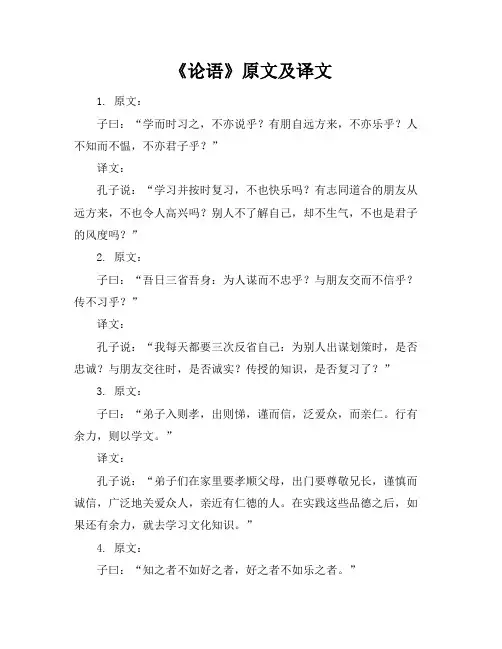
《论语》原文及译文1. 原文:子曰:“学而时习之,不亦说乎?有朋自远方来,不亦乐乎?人不知而不愠,不亦君子乎?”译文:孔子说:“学习并按时复习,不也快乐吗?有志同道合的朋友从远方来,不也令人高兴吗?别人不了解自己,却不生气,不也是君子的风度吗?”2. 原文:子曰:“吾日三省吾身:为人谋而不忠乎?与朋友交而不信乎?传不习乎?”译文:孔子说:“我每天都要三次反省自己:为别人出谋划策时,是否忠诚?与朋友交往时,是否诚实?传授的知识,是否复习了?”3. 原文:子曰:“弟子入则孝,出则悌,谨而信,泛爱众,而亲仁。
行有余力,则以学文。
”译文:孔子说:“弟子们在家里要孝顺父母,出门要尊敬兄长,谨慎而诚信,广泛地关爱众人,亲近有仁德的人。
在实践这些品德之后,如果还有余力,就去学习文化知识。
”4. 原文:子曰:“知之者不如好之者,好之者不如乐之者。
”孔子说:“懂得知识的人不如喜爱知识的人,喜爱知识的人不如以知识为乐的人。
”5. 原文:子曰:“三人行,必有我师焉。
择其善者而从之,其不善者而改之。
”译文:孔子说:“三个人一起行走,必定有我的老师在其中。
选择他们的优点去学习,看到他们的缺点就改正。
”《论语》原文及译文6. 原文:子曰:“君子不器。
”译文:孔子说:“君子不应局限于某一方面的才能。
”7. 原文:子曰:“不患人之不己知,患不知人也。
”译文:孔子说:“不担心别人不了解自己,担心的是自己不了解别人。
”8. 原文:子曰:“过而不改,是谓过矣。
”译文:孔子说:“犯了错误而不改正,这才是真正的错误。
”9. 原文:子曰:“民无信不立。
”孔子说:“一个国家如果没有信用,就无法立足。
”10. 原文:子曰:“仁者爱人,智者知人。
”译文:孔子说:“仁者关爱他人,智者了解他人。
”11. 原文:子曰:“君子和而不同,小人同而不和。
”译文:孔子说:“君子能够和谐相处,即使意见不同;小人虽然意见相同,却不能和谐相处。
”12. 原文:子曰:“温故而知新,可以为师矣。
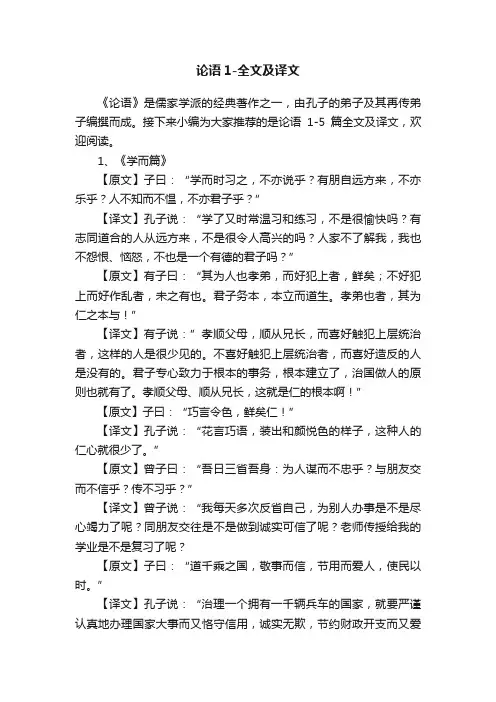
论语1-全文及译文《论语》是儒家学派的经典著作之一,由孔子的弟子及其再传弟子编撰而成。
接下来小编为大家推荐的是论语1-5篇全文及译文,欢迎阅读。
1、《学而篇》【原文】子曰:“学而时习之,不亦说乎?有朋自远方来,不亦乐乎?人不知而不愠,不亦君子乎?”【译文】孔子说:“学了又时常温习和练习,不是很愉快吗?有志同道合的人从远方来,不是很令人高兴的吗?人家不了解我,我也不怨恨、恼怒,不也是一个有德的君子吗?”【原文】有子曰:“其为人也孝弟,而好犯上者,鲜矣;不好犯上而好作乱者,未之有也。
君子务本,本立而道生。
孝弟也者,其为仁之本与!”【译文】有子说:”孝顺父母,顺从兄长,而喜好触犯上层统治者,这样的人是很少见的。
不喜好触犯上层统治者,而喜好造反的人是没有的。
君子专心致力于根本的事务,根本建立了,治国做人的原则也就有了。
孝顺父母、顺从兄长,这就是仁的根本啊!”【原文】子曰:“巧言令色,鲜矣仁!”【译文】孔子说:“花言巧语,装出和颜悦色的样子,这种人的仁心就很少了。
”【原文】曾子曰:“吾日三省吾身:为人谋而不忠乎?与朋友交而不信乎?传不习乎?”【译文】曾子说:“我每天多次反省自己,为别人办事是不是尽心竭力了呢?同朋友交往是不是做到诚实可信了呢?老师传授给我的学业是不是复习了呢?【原文】子曰:“道千乘之国,敬事而信,节用而爱人,使民以时。
”【译文】孔子说:“治理一个拥有一千辆兵车的国家,就要严谨认真地办理国家大事而又恪守信用,诚实无欺,节约财政开支而又爱护官吏臣僚,役使百姓要不误农时”。
【原文】子曰:“弟子入则孝,出则弟,谨而信,泛爱众,而亲仁,行有余力,则以学文。
”【译文】孔子说:“弟子们在父母跟前,就孝顺父母;出门在外,要顺从师长,言行要谨慎,要诚实可信,寡言少语,要广泛地去爱众人,亲近那些有仁德的人。
这样躬行实践之后,还有余力的话,就再去学习文献知识。
”【原文】子夏曰:“贤贤易色;事父母,能竭其力;事君,能致其身;与朋友交,言而有信。
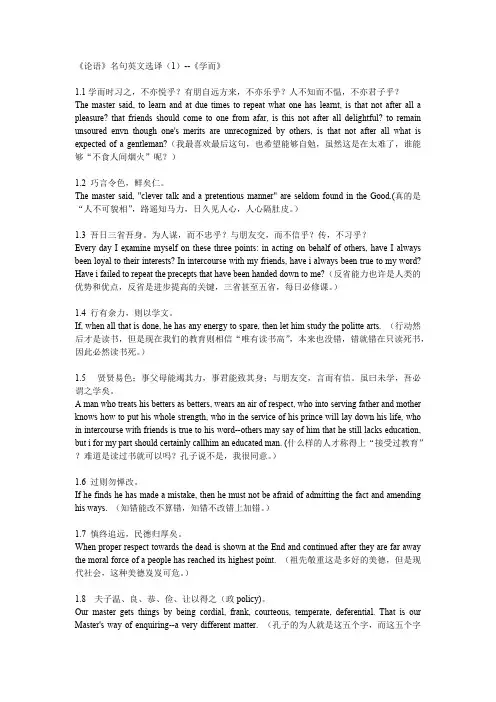
《论语》名句英文选译(1)--《学而》1.1学而时习之,不亦悦乎?有朋自远方来,不亦乐乎?人不知而不愠,不亦君子乎?The master said, to learn and at due times to repeat what one has learnt, is that not after all a pleasure? that friends should come to one from afar, is this not after all delightful? to remain unsoured envn though one's merits are unrecognized by others, is that not after all what is expected of a gentleman?(我最喜欢最后这句,也希望能够自勉,虽然这是在太难了,谁能够“不食人间烟火”呢?)1.2 巧言令色,鲜矣仁。
The master said, "clever talk and a pretentious manner" are seldom found in the Good.(真的是“人不可貌相”,路遥知马力,日久见人心,人心隔肚皮。
)1.3 吾日三省吾身。
为人谋,而不忠乎?与朋友交,而不信乎?传,不习乎?Every day I examine myself on these three points: in acting on behalf of others, have I always been loyal to their interests? In intercourse with my friends, have i always been true to my word? Have i failed to repeat the precepts that have been handed down to me?(反省能力也许是人类的优势和优点,反省是进步提高的关键,三省甚至五省,每日必修课。
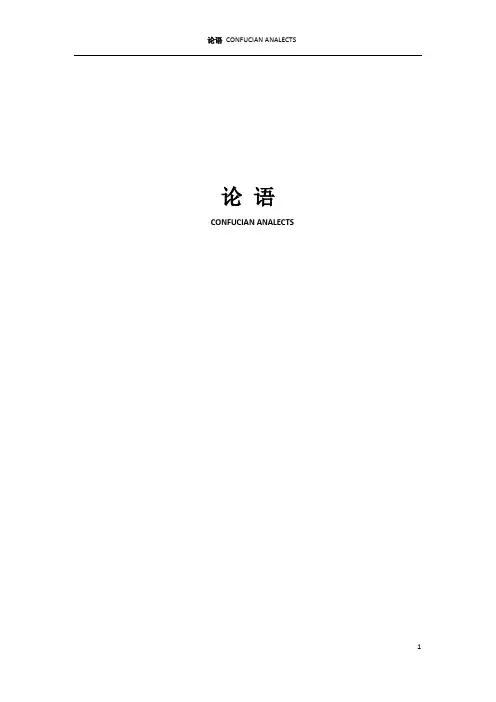
论语 CONFUCIAN ANALECTS学而第一『⒈1』子曰:“学而时习之,不亦说乎?有朋自远方来,不亦乐乎?人不知而不愠,不亦君子乎?”The Master said: "Is it not pleasant to learn with a constant perseverance and application? "Is it not delightful to have friends coming from distant quarters? "Is he not a man of complete virtue, who feels no discomposure though men may take no note of him?"『⒈2』有子曰:“其为人也孝弟,而好犯上者,鲜矣;不好犯上,而好作乱者,未之有也。
君子务本,本立而道生。
孝弟也者,其为仁之本与!”The philosopher Yu said, "They are few who, being filial and fraternal, are fond of offending against their superiors. There have been none, who, not liking to offend against their superiors, have been fond of stirring up confusion. "The superior man bends his attention to what is radical. That being established, all practical courses naturally grow up. Filial piety and fraternal submission,-are they not the root of all benevolent actions?"『⒈3』子曰:“巧言令色,鲜矣仁!”The Master said, "Fine words and an insinuating appearance are seldom associated with true virtue."『⒈4』曾子曰:“吾日三省吾身——为人谋而不忠乎?于朋友交而不信乎?传不习乎?”The philosopher Tsang said, "I daily examine myself on three points:-whether, in transacting business for others, I may have been not faithful;-whether, in intercourse with friends, I may have been not sincere;-whether I may have not mastered and practiced the instructions of my teacher."『⒈5』子曰:“道千乘之国,敬事而信,节用而爱人,使民以时。
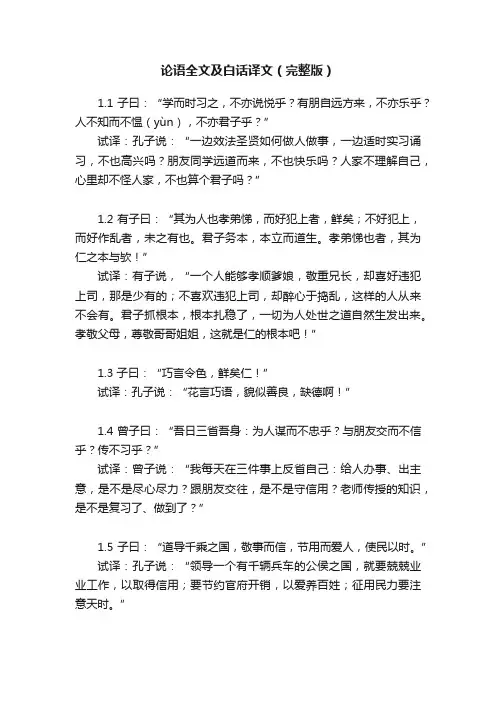
论语全文及白话译文(完整版)1.1 子曰:“学而时习之,不亦说悦乎?有朋自远方来,不亦乐乎?人不知而不愠(yùn),不亦君子乎?”试译:孔子说:“一边效法圣贤如何做人做事,一边适时实习诵习,不也高兴吗?朋友同学远道而来,不也快乐吗?人家不理解自己,心里却不怪人家,不也算个君子吗?”1.2 有子曰:“其为人也孝弟悌,而好犯上者,鲜矣;不好犯上,而好作乱者,未之有也。
君子务本,本立而道生。
孝弟悌也者,其为仁之本与欤!”试译:有子说,“一个人能够孝顺爹娘,敬重兄长,却喜好违犯上司,那是少有的;不喜欢违犯上司,却醉心于捣乱,这样的人从来不会有。
君子抓根本,根本扎稳了,一切为人处世之道自然生发出来。
孝敬父母,尊敬哥哥姐姐,这就是仁的根本吧!”1.3 子曰:“巧言令色,鲜矣仁!”试译:孔子说:“花言巧语,貌似善良,缺德啊!”1.4 曾子曰:“吾日三省吾身:为人谋而不忠乎?与朋友交而不信乎?传不习乎?”试译:曾子说:“我每天在三件事上反省自己:给人办事、出主意,是不是尽心尽力?跟朋友交往,是不是守信用?老师传授的知识,是不是复习了、做到了?”1.5 子曰:“道导千乘之国,敬事而信,节用而爱人,使民以时。
”试译:孔子说:“领导一个有千辆兵车的公侯之国,就要兢兢业业工作,以取得信用;要节约官府开销,以爱养百姓;征用民力要注意天时。
”1.6 子曰:“弟子入则孝,出则弟悌,谨而信,泛爱众,而亲仁。
行有余力,则以学文。
”试译:孔子说:“弟子在家里对父兄孝悌,在外面对公卿忠顺,恭谨老实,博爱众人,亲近仁者。
这样子做好了,还有剩余精力,可以读点书。
”1.7 子夏曰:“贤贤易色;事父母,能竭其力;事君,能致其身;与朋友交,言而有信。
虽曰未学,吾必谓之学矣。
”试译:子夏说:“尊敬贤人,连自己平时待人接物的态度也变好了;服侍父母,能竭尽全力;辅佐君长,能不惜身命;与朋友结交,说话算数。
做到了这几点,即使说没读过书,我却敢断定他有学问。
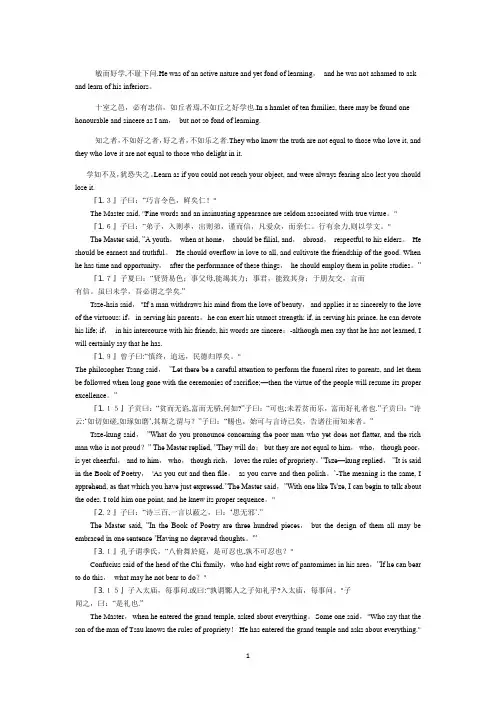
敏而好学,不耻下问.He was of an active nature and yet fond of learning,and he was not ashamed to ask and learn of his inferiors。
十室之邑,必有忠信,如丘者焉,不如丘之好学也.In a hamlet of ten families, there may be found one honourable and sincere as I am,but not so fond of learning.知之者,不如好之者,好之者,不如乐之者.They who know the truth are not equal to those who love it, and they who love it are not equal to those who delight in it.学如不及,犹恐失之。
Learn as if you could not reach your object, and were always fearing also lest you should lose it.『⒈3』子曰:“巧言令色,鲜矣仁!"The Master said, "Fine words and an insinuating appearance are seldom associated with true virtue。
"『⒈6』子曰:“弟子,入则孝,出则弟,谨而信,凡爱众,而亲仁。
行有余力,则以学文。
"The Master said, ”A youth,when at home,should be filial, and,abroad,respectful to his elders。
He should be earnest and truthful。
He should overflow in love to all, and cultivate the friendship of the good. When he has time and opportunity,after the performance of these things,he should employ them in polite studies。
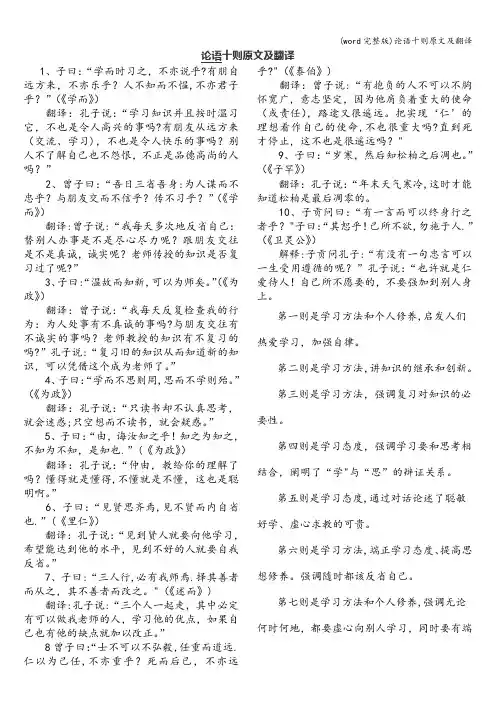
(word完整版)论语十则原文及翻译论语十则原文及翻译1、子曰:“学而时习之,不亦说乎?有朋自远方来,不亦乐乎?人不知而不愠,不亦君子乎?”(《学而》)翻译:孔子说:“学习知识并且按时温习它,不也是令人高兴的事吗?有朋友从远方来(交流、学习),不也是令人快乐的事吗?别人不了解自己也不怨恨,不正是品德高尚的人吗?”2、曾子曰:“吾日三省吾身:为人谋而不忠乎?与朋友交而不信乎?传不习乎?”(《学而》)翻译:曾子说:“我每天多次地反省自己:替别人办事是不是尽心尽力呢?跟朋友交往是不是真诚,诚实呢?老师传授的知识是否复习过了呢?”3、子曰:“温故而知新,可以为师矣。
”(《为政》)翻译:曾子说:“我每天反复检查我的行为:为人处事有不真诚的事吗?与朋友交往有不诚实的事吗?老师教授的知识有不复习的吗?”孔子说:“复习旧的知识从而知道新的知识,可以凭借这个成为老师了。
”4、子曰:“学而不思则罔,思而不学则殆。
”(《为政》)翻译:孔子说:“只读书却不认真思考,就会迷惑;只空想而不读书,就会疑惑。
”5、子曰:“由,诲汝知之乎!知之为知之,不知为不知,是知也.”(《为政》)翻译:孔子说:“仲由,教给你的理解了吗?懂得就是懂得,不懂就是不懂,这也是聪明啊。
”6、子曰:“见贤思齐焉,见不贤而内自省也.”(《里仁》)翻译:孔子说:“见到贤人就要向他学习,希望能达到他的水平,见到不好的人就要自我反省。
”7、子曰:“三人行,必有我师焉.择其善者而从之,其不善者而改之。
"(《述而》) 翻译:孔子说:“三个人一起走,其中必定有可以做我老师的人,学习他的优点,如果自己也有他的缺点就加以改正。
”8曾子曰:“士不可以不弘毅,任重而道远.仁以为己任,不亦重乎?死而后已,不亦远乎?"(《泰伯》)翻译:曾子说:“有抱负的人不可以不胸怀宽广,意志坚定,因为他肩负着重大的使命(或责任),路途又很遥远。
把实现‘仁’的理想看作自己的使命,不也很重大吗?直到死才停止,这不也是很遥远吗?"9、子曰:“岁寒,然后知松柏之后凋也。
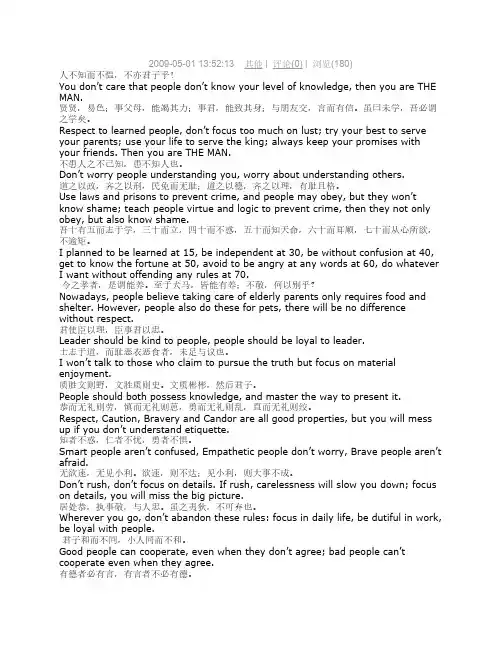
2009-05-01 13:52:13 其他 | 评论(0) | 浏览(180)人不知而不愠,不亦君子乎!You don’t care that people don’t know your level of knowledge, then you are THE MAN.贤贤,易色;事父母,能竭其力;事君,能致其身;与朋友交,言而有信。
虽曰未学,吾必谓之学矣。
Respect to learned people, don’t focus too much on lust; try your best to serve your parents; use your life to serve the king; always keep your promises with your friends. Then you are THE MAN.不患人之不己知,患不知人也。
Don’t worry people understanding you, worry about understanding others.道之以政,齐之以刑,民免而无耻;道之以德,齐之以理,有耻且格。
Use laws and prisons to prevent crime, and people may obey, but they won’t know shame; teach people virtue and logic to prevent crime, then they not only obey, but also know shame.吾十有五而志于学,三十而立,四十而不惑,五十而知天命,六十而耳顺,七十而从心所欲,不逾矩。
I planned to be learned at 15, be independent at 30, be without confusion at 40, get to know the fortune at 50, avoid to be angry at any words at 60, do whatever I want without offending any rules at 70.今之孝者,是谓能养。
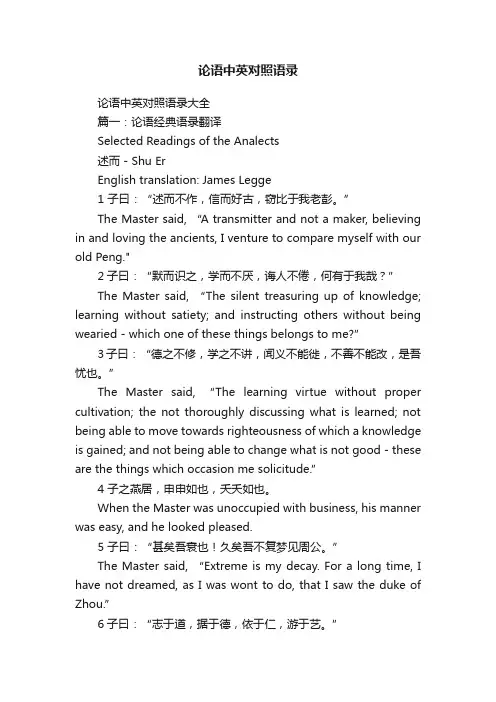
论语中英对照语录论语中英对照语录大全篇一:论语经典语录翻译Selected Readings of the Analects述而 - Shu ErEnglish translation: James Legge1 子曰:“述而不作,信而好古,窃比于我老彭。
”The Master said, “A transmitter and not a maker, believing in and loving the ancients, I venture to compare myself with our old Peng."2子曰:“默而识之,学而不厌,诲人不倦,何有于我哉?”The Master said, “The silent treasuring up of knowledge; learning without satiety; and instructing others without being wearied - which one of these things belongs to me?”3子曰:“德之不修,学之不讲,闻义不能徙,不善不能改,是吾忧也。
”The Master said, “The learning virtue without proper cultivation; the not thoroughly discussing what is learned; not being able to move towards righteousness of which a knowledge is gained; and not being able to change what is not good - these are the things which occasion me solicitude.”4 子之燕居,申申如也,夭夭如也。
When the Master was unoccupied with business, his manner was easy, and he looked pleased.5 子曰:“甚矣吾衰也!久矣吾不复梦见周公。
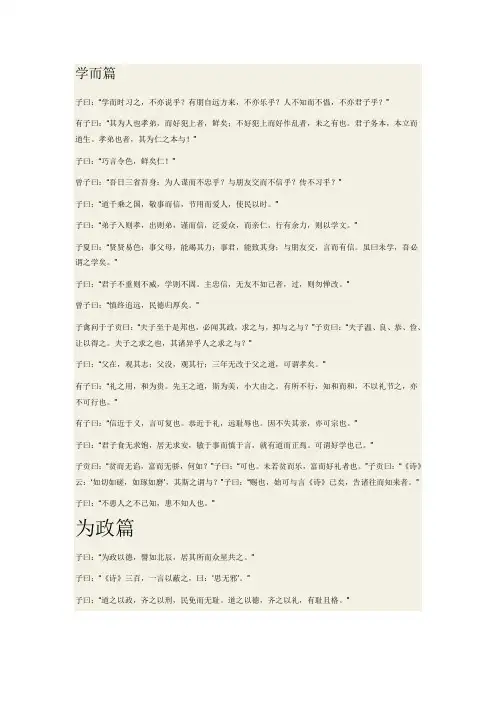
学而篇子曰:“学而时习之,不亦说乎?有朋自远方来,不亦乐乎?人不知而不愠,不亦君子乎?”有子曰:“其为人也孝弟,而好犯上者,鲜矣;不好犯上而好作乱者,未之有也。
君子务本,本立而道生。
孝弟也者,其为仁之本与!”子曰:“巧言令色,鲜矣仁!”曾子曰:“吾日三省吾身:为人谋而不忠乎?与朋友交而不信乎?传不习乎?”子曰:“道千乘之国,敬事而信,节用而爱人,使民以时。
”子曰:“弟子入则孝,出则弟,谨而信,泛爱众,而亲仁,行有余力,则以学文。
”子夏曰:“贤贤易色;事父母,能竭其力;事君,能致其身;与朋友交,言而有信。
虽曰未学,吾必谓之学矣。
”子曰:“君子不重则不威,学则不固。
主忠信,无友不如己者,过,则勿惮改。
”曾子曰:“慎终追远,民德归厚矣。
”子禽问于子贡曰:“夫子至于是邦也,必闻其政,求之与,抑与之与?”子贡曰:“夫子温、良、恭、俭、让以得之。
夫子之求之也,其诸异乎人之求之与?”子曰:“父在,观其志;父没,观其行;三年无改于父之道,可谓孝矣。
”有子曰:“礼之用,和为贵。
先王之道,斯为美,小大由之。
有所不行,知和而和,不以礼节之,亦不可行也。
”有子曰:“信近于义,言可复也。
恭近于礼,远耻辱也。
因不失其亲,亦可宗也。
”子曰:“君子食无求饱,居无求安,敏于事而慎于言,就有道而正焉。
可谓好学也已。
”子贡曰:“贫而无谄,富而无骄,何如?”子曰:“可也。
未若贫而乐,富而好礼者也。
”子贡曰:“《诗》云:‘如切如磋,如琢如磨’,其斯之谓与?”子曰:“赐也,始可与言《诗》已矣,告诸往而知来者。
”子曰:“不患人之不己知,患不知人也。
”为政篇子曰:“为政以德,譬如北辰,居其所而众星共之。
”子曰:“《诗》三百,一言以蔽之,曰:‘思无邪’。
”子曰:“道之以政,齐之以刑,民免而无耻。
道之以德,齐之以礼,有耻且格。
”子曰:“吾十有五而志于学,三十而立,四十而不惑,五十而知天命,六十而耳顺,七十而从心所欲,不逾矩。
”孟懿子问孝,子曰:“无违。
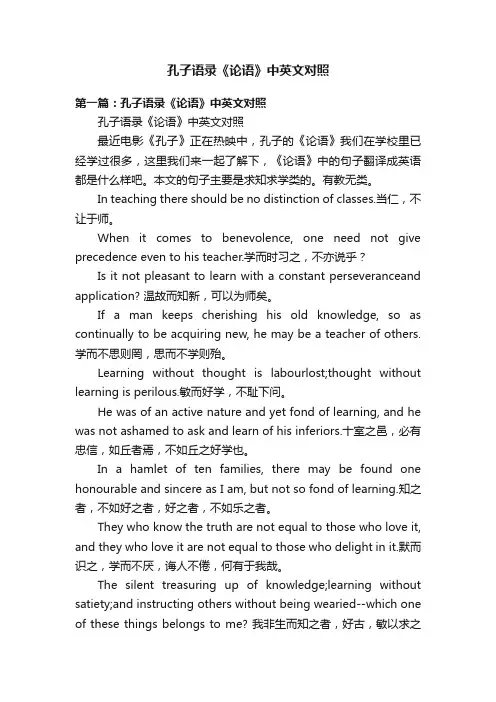
孔子语录《论语》中英文对照第一篇:孔子语录《论语》中英文对照孔子语录《论语》中英文对照最近电影《孔子》正在热映中,孔子的《论语》我们在学校里已经学过很多,这里我们来一起了解下,《论语》中的句子翻译成英语都是什么样吧。
本文的句子主要是求知求学类的。
有教无类。
In teaching there should be no distinction of classes.当仁,不让于师。
When it comes to benevolence, one need not give precedence even to his teacher.学而时习之,不亦说乎?Is it not pleasant to learn with a constant perseveranceand application? 温故而知新,可以为师矣。
If a man keeps cherishing his old knowledge, so as continually to be acquiring new, he may be a teacher of others.学而不思则罔,思而不学则殆。
Learning without thought is labourlost;thought without learning is perilous.敏而好学,不耻下问。
He was of an active nature and yet fond of learning, and he was not ashamed to ask and learn of his inferiors.十室之邑,必有忠信,如丘者焉,不如丘之好学也。
In a hamlet of ten families, there may be found one honourable and sincere as I am, but not so fond of learning.知之者,不如好之者,好之者,不如乐之者。
可编辑修改精选全文完整版孔子《论语》全文及译文孔子《论语》全文及译文导语:《论语》主要记录孔子及其弟子的言行,较为集中地反映了孔子的思想,由孔子弟子及再传弟子编写而成,至汉代成书。
下面是小编收集整理的孔子《论语》全文及译文,供各位阅读和借鉴。
《论语》全文及译文1、子曰:“学而时习之,不亦说乎?有朋自远方来,不亦乐乎?人不知而不愠,不亦君子乎?”译文孔子说:“学了又时常温习和练习,不是很愉快吗?有志同道合的人从远方来,不是很令人高兴的吗?人家不了解我,我也不怨恨、恼怒,不也是一个有德的君子吗?”2、子曰:“巧言令色,鲜矣仁。
”译文孔子说:“花言巧语、满脸堆笑的,这种人是很少有仁德的。
”3、曾子曰:“吾日三省吾身,为人谋而不忠乎?与朋友交而不信乎?传不习乎?”译文曾子说:“我每天都要多次反省自己:为别人出主意做事,是否忠实?交友是否守信?老师传授的知识,是否复习了呢?”4、子曰:“君子食无求饱,居无求安,敏于事而慎于言,就有道而正焉,可谓好学也已。
”译文孔子说:“君子吃不追求饱足,住不追求安逸,做事灵敏,言谈谨慎,时时改正自己的错误,就算好学了。
”5、子曰:“不患人之不己知,患不知人也。
”译文孔子说:“不怕没人了解自己,就怕自己不了解别人。
”6、子曰:“《诗》三百,一言以蔽之,曰:‘思无邪。
’”译文孔子说:“《诗经》三百(零五)首,用一句话可以概括,即:‘思想纯正,没有邪恶的东西。
’”7、子曰:“吾十有五而志于学,三十而立,四十而不惑,五十而知天命,六十而耳顺,七十而从心所欲,不逾矩。
”译文孔子说:“我十五岁,有志于学问;三十岁,(懂礼仪,)说话做事都有把握;四十岁,(掌握了各种知识,)不致迷惑;五十岁,得知天命;六十岁,一听别人言语,便可以分别真假,判明是非;到了七十岁,便随心所欲,任何念头都不会越出规矩。
”8、子曰:“温故而知新,可以为师矣。
”译文孔子说:“复习旧知识时,又能领悟到新的东西,就可以凭着做老师了。
《论语》原文_翻译_完整版原文:子曰:“学而时习之,不亦说乎?有朋自远方来,不亦乐乎?人不知而不愠,不亦君子乎?”翻译:孔子说:“学习并时常温习,不是很愉快吗?有志同道合的人从远方来,不是很令人高兴吗?别人不了解我,我却不生气,不也是君子吗?”完整版:《论语》由孔子弟子及再传弟子记录整理而成,成书于战国前期。
全书共20篇492章,以语录体为主,叙事体为辅,较为集中地体现了孔子及儒家学派的政治主张、伦理思想、道德观念及教育原则等。
孔子(公元前551年9月28日-公元前479年4月11日),子姓,孔氏,名丘,字仲尼,鲁国陬邑(今山东曲阜市)人,祖籍宋国栗邑(今河南省夏邑县),中国古代思想家、政治家、教育家,儒家学派创始人、“大成至圣先师”。
《论语》原文_翻译_完整版原文:子曰:“吾十有五而志于学,三十而立,四十而不惑,五十而知天命,六十而耳顺,七十而从心所欲,不逾矩。
”翻译:孔子说:“我十五岁就立志学习,三十岁能够自立,四十岁不再感到困惑,五十岁懂得了天命,六十岁能顺从天命,七十岁能随心所欲而不越出规矩。
”完整版:《论语》作为儒家经典,对后世产生了深远的影响。
它不仅记录了孔子的言行,还反映了其弟子的思想。
书中充满了关于道德、政治、教育等方面的智慧。
孔子的教导强调了个人修养与社会责任,鼓励人们追求知识和道德的完善。
这些思想至今仍对个人和社会有着重要的指导意义。
《论语》的每一章都包含了深刻的哲理和实用的智慧,适合不同年龄和背景的人阅读。
通过学习和实践《论语》中的教诲,人们可以提升自己的道德水平,增强社会责任感,从而在个人和社会层面都取得进步。
《论语》原文_翻译_完整版原文:子曰:“君子不器。
”翻译:孔子说:“君子不应局限于某一方面的才能。
”完整版:《论语》不仅是一部哲学著作,更是一部关于如何成为君子的指南。
孔子强调,君子应该具备全面的才能和品质,不应被某一方面的才能所限制。
他认为,真正的君子应该具备仁、义、礼、智、信五种美德,这样才能成为社会的栋梁之才。
中英文对照版《论语》性相近也,习相远也。
By nature,men are nearly alike;by practice, they get to be wide apart.过而不改,是谓过矣.Not to mend the fault one has made is to err indeed.己所不欲,勿施于人。
What you do not want done to yourself,do not do to others。
言必信,行必果。
Keep what you say and carry out what you do。
君子以文会友,以友辅仁。
The superior man on grounds of culture meets with his friends,and by their friendsh ip helps his virtue.三军可夺师也,匹夫不可夺志也。
The commander of the forces of a large State may be carried off, but the will of even a common man cannot be taken from him。
后生可畏,焉知来者之不如今也?A youth is to be regarded with respect。
How do you know that his future wi ll not be equal to our present?有朋自远方来,不亦乐乎?Is it not delightful to have friends coming from distant quarters?人不知而不愠,不亦君子乎?Is he not a man of complete virtue,who feels no discomposure though men may take no note of him?父在,观其志。
(完整word版)《论语》选段翻译(中英文对照)《论语》选段翻译(中英文对照)子曰:“志士仁人,无求生以害仁,有杀身以成仁。
”Confucius said,“A man with lofty ideals or humane man never gives up humanity to save his life, but may sacrifice his life to achieve humanity.”子曰:“知者乐水,仁者乐山;知者动,仁者静;知者乐,仁者寿。
”Confucius said,“The wise enjoy water, the humane enjoy mountains. The wise are active, the humane are quiet. The wise are happy; the humane live long lives. ”林放问礼之本。
子曰:“大哉问!礼与其奢也宁俭;丧与其易也宁戚。
”Lin Fang asked about the essence of the rites. Confucius said, “A very significant question! The rites should be performed in a frugal way rather than in an extravagant way. Funerals should be held with grief rather than with pomposity.”子曰:“不患无位,患所以立。
Confucius said,“One should worry not about having no official position, but about having no prope r qualifications. ““不患莫己知,求为可知也。
"”One should not seek to be known to others, but seek to acquire the qualities worthy of being known.”子曰:“人无远虑,必有近忧。
《论语》名句英文选译(1)--《学而》1.1学而时习之,不亦悦乎?有朋自远方来,不亦乐乎?人不知而不愠,不亦君子乎?The master said, to learn and at due times to repeat what one has learnt, is that not after all a pleasure? that friends should come to one from afar, is this not after all delightful? to remain unsoured envn though one’s merits are unrecognized by others, is that not after all what is expected of a gentleman?(我最喜欢最后这句,也希望能够自勉,虽然这是在太难了,谁能够“不食人间烟火”呢?)1。
2 巧言令色,鲜矣仁。
The master said,”clever talk and a pretentious manner" are seldom fo und in the Good。
(真的是“人不可貌相”,路遥知马力,日久见人心,人心隔肚皮。
)1。
3 吾日三省吾身.为人谋,而不忠乎?与朋友交,而不信乎?传,不习乎?Every day I examine myself on these three points: in acting on behalf of others, have I always been loyal to their interests? In intercourse with my friends, have i always been true to my word?Have i failed to repeat the precepts that have been handed down to me?(反省能力也许是人类的优势和优点,反省是进步提高的关键,三省甚至五省,每日必修课。
论语全书原文注释译文《论语》是儒家学派的经典著作之一,由孔子的弟子及其再传弟子编撰而成。
它以语录体和对话文体为主,记录了孔子及其弟子言行,集中体现了孔子的政治主张、伦理思想、道德观念及教育原则等。
以下是《论语》的部分原文、注释及译文:1.学而篇:1.原文:子曰:“学而时习之,不亦说乎?有朋自远方来,不亦乐乎?人不知而不愠,不亦君子乎?”2.注释:1.子:《论语》中“子曰” 的“子” 都是孔子的学生对孔子的敬称。
2.时:时时,经常。
3.习:演习,复习。
4.说:同“悦”,高兴。
5.愠(yùn):恼怒,怨恨。
3.译文:孔子说:“学了,又经常复习它,不也是高兴的吗?有朋友从远方来,不也是快乐的吗?人家不了解我,我也不怨恨,不也是君子吗?”2.为政篇:1.原文:子曰:“为政以德,譬如北辰,居其所而众星共之。
”2.注释:1.为政以德:以道德原则治理国家。
2.北辰:北极星。
3.共:同“拱”,环绕。
3.译文:孔子说:“用道德来治理国政,自己便会像北极星一般,在一定的位置上,别的星辰都环绕着它。
”3.八佾篇:1.原文:孔子谓季氏:“八佾舞于庭,是可忍也,孰不可忍也?”2.注释:1.季氏:鲁国正卿季孙氏。
2.八佾(yì):古代乐舞的行列,一行八人叫一佾。
按照礼的规定,天子用八佾,诸侯用六佾,大夫用四佾,士用二佾。
季氏是大夫,按规定只能用四佾,却用了天子的八佾,这是严重的越礼行为。
3.忍:忍心,这里指容忍。
3.译文:孔子谈到季孙氏说:“他用天子的舞蹈阵容在自己的宗庙里舞蹈,这样的事可以容忍,什么事不能容忍?”4.里仁篇:1.原文:子曰:“里仁为美。
择不处仁,焉得知?”2.注释:1.里:居住。
2.仁:有仁德的地方。
3.处:居住。
4.知:同“智”,智慧。
3.译文:孔子说:“居住在有仁德的地方才是好的。
选择住处,不居住在有仁德的地方,怎么能说是明智的呢?”5.公冶长篇:1.原文:子谓公冶长:“可妻也。
虽在缧绁之中,非其罪也。
《论语》选段翻译(中英文对照)子曰:“志士仁人,无求生以害仁,有杀身以成仁。
”Confucius said,“A man with lofty ideals or humane man never gives up humanity to save his life, but may sacrifice his life to achieve humanity.”子曰:“知者乐水,仁者乐山;知者动,仁者静;知者乐,仁者寿。
”Confucius said,“The wise enjoy water, the humane enjoy mountains. The wise are active, the humane are quiet. The wise are happy; the humane live long lives. ”林放问礼之本。
子曰:“大哉问!礼与其奢也宁俭;丧与其易也宁戚。
”Lin Fang asked about the essence of the rites. Confucius said, “A very significant question! The rites should be performed in a frugal way rather than in an extravagant way. Funerals should be held with grief rather than with pomposity.”子曰:“不患无位,患所以立。
Confucius said,“One should worry not about having no official position, but about having no prope r qualifications. ““不患莫己知,求为可知也。
"”One should not seek to be known to others, but seek to acquire the qualities worthy of being known.”子曰:“人无远虑,必有近忧。
”Confucius said,“He who does not think of the future is certain to have immediate worries.”子曰:“躬自厚而薄责于人,责远怨矣。
”Confucius said,“One can keep hatred and grievance away by putting more blame on oneself and less on others for any fault.”子曰:“过而不改,是谓过矣。
”Confucius said,“A fault that is not amended is a real fault.”子曰:“能以礼让为国乎?何有?不能以礼让为国乎,如礼何?”Confucius said,“What difficulties would there be if a state was governed with the rites and decorum? What use would the rites have if a state was not governed with the rites and decorum?”子曰:“居上不宽,为礼不敬,临丧不哀,吾何以观之哉?”Confucius said,“What is there for me to observe of a man if he is not broad-minded when he is in high position, not reverent when he is performing the rites, and not sad when he is in mourning?”子曰:“君子博学于文,约之于礼,亦可以弗畔矣夫。
”Confucius said,“A gentleman who studies the classics extensively and restrains himself with therites will not depart from the Way. ”子曰:“弟子入则孝,出则弟”Confucius said,“Young people should be filial to their parents at home and respectful to their brothers when they are with them. ””谨而信,泛爱众,而亲仁。
“”They should be serious and trustworthy, love the populace extensively and be close to those who are humane. “行有余力,则以学文。
”“When all this is done and there is time for other things, they should use it for the study of the classics.”子曰:“父母在,不远游,游必有方。
”Confucius said,“While one’s parents are alive, one should not travel to distant places. If it is necessary to travel, there should be a definite direction.”子曰:“岁寒,然后知松柏之后凋也。
”Confucius said,“Only in cold winter does one know that the pine and the cypress are the last to shed their l eaves.”子曰:“君子喻于义,小人喻于利。
”Confucius said,“The gentleman knows what is right; the mean person keeps his mind only on gains."子曰:“君子周而不比,小人比而不周。
”Confucius said,“The gentleman unites and does not plot with others; the mean man plots and does not unite wi th others.”子曰:“君子和而不同,小人同而不和。
”Confucius said,“The gentleman aims at harmony, and not at uniformity. The mean man aims at uniformity, and not at harmony.”子曰:“德之不修,学之不讲。
闻义不能徒,不善不能改,是吾忧也。
”Confucius said,“Neglect of moral cultivation, neglect of learning and practicing what has been learned, failure to follow what is right, and failure to correct what is wrong—these are my worries.”子曰:“益有三乐,损有三乐。
"Confucius said,“Three kinds of pleasure are beneficial, and three kinds pleasure are harmful. “乐节礼乐,乐道人之善,乐多贤友,益矣。
”The pleasure of being regulated by the rites and music, the pleasure of praising other men’sgoodness, and the pleasure of having many virtuous friends are beneficial. “"乐骄乐,乐佚游,乐宴乐,损矣。
”"The pleasure of being conceited, the pleasure of unrestrained wanderings, and the pleasure of indulging in eating and drinking are harmful.”子曰:“见贤思齐焉,见不贤而内自省也。
”Confucius said,“When one sees a virtuous man, one should think of exerting oneself to be like him; when one sees someone who is not virtuous, one should examine onself.”子曰:“学而时习之,不亦说乎?The Master said, To learn and at due times to repeat what one has learnt, is that not after all a pleasure?有朋自远方来,不亦乐乎?That friends should come to one from afar, is this not after all delightful?人不知而不愠,不亦君子乎?”To remain unsoured even though one’s merits are unrecognized by others, is that not after all what is expected of a gentleman?曾子曰:“吾日三省吾身:Master Tseng said, Every day I examine myself on these three points:为人谋而不忠乎?in acting on behalf of others, have I always been loyal to their interests?与朋友交而不信乎?In intercourse with my friends, have I always been true to my word?传不习乎?”Have I failed to repeat the precepts that have been handed down to me?有子曰:“礼之用,和为贵。